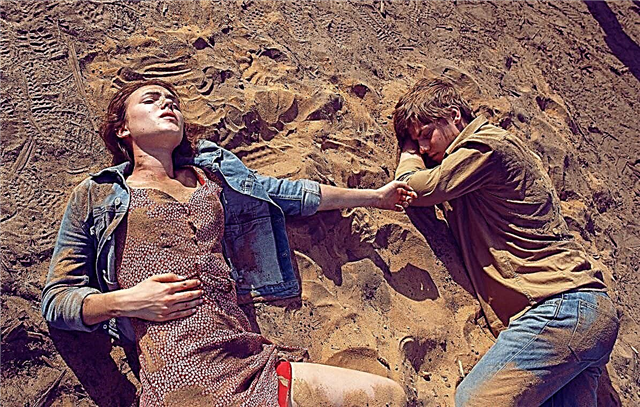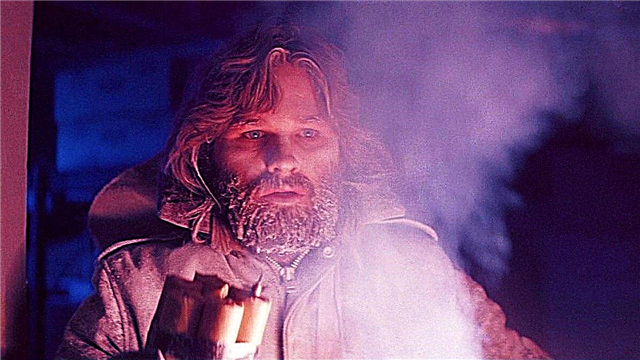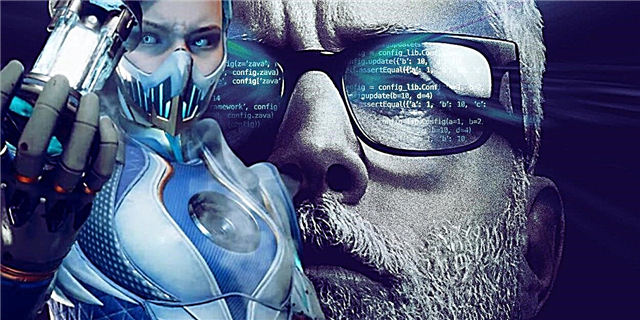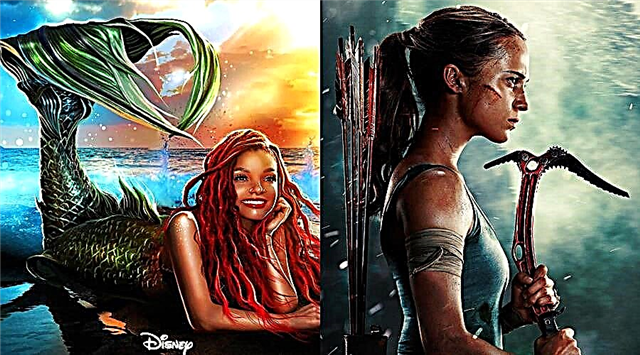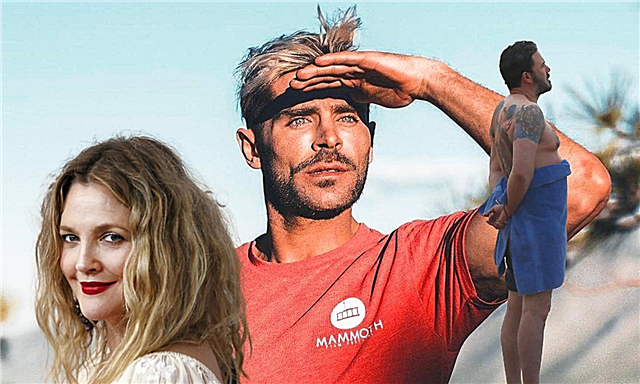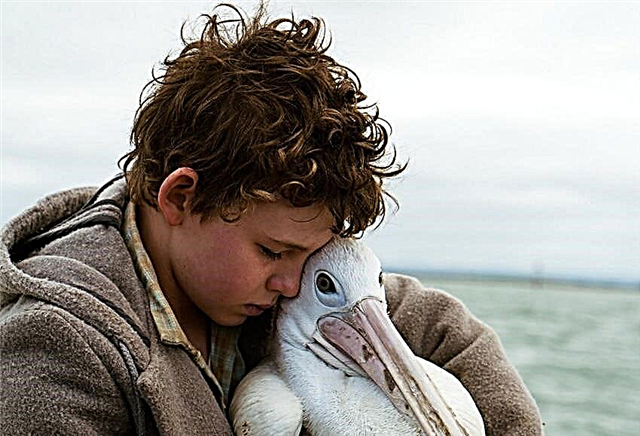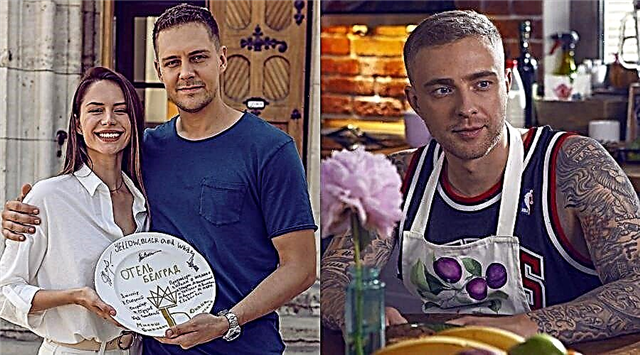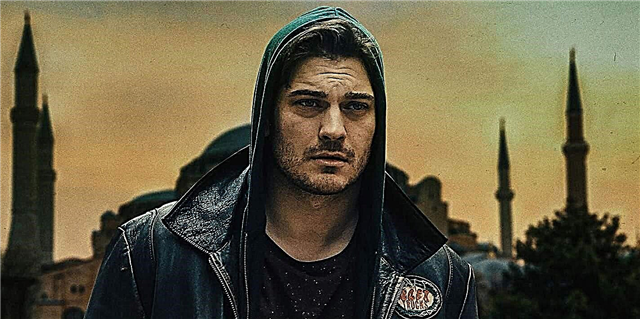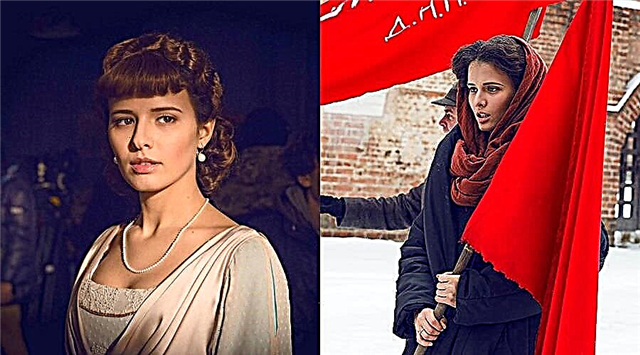On February 27, 2020 Justin Kurzel's new film "The True Story of the Kelly Gang" will be released. The life of the famous gangster Ned Kelly, at the very mention of whose name the entire police trembled. His daring bank robberies were legendary, and a huge reward was assigned to his head. One of the most controversial characters in the world of crime history, who was considered by many to be a noble robber and the real Robin Hood. Find out interesting information about the filming of The True Story of the Kelly Gang (2020), facts about casting, filming and working on the script.

Details about the film
Casting
After a lengthy search, George McKay was asked to play the role of adult Ned Kelly. He grew up in London, his father is from Adelaide (Australia) and has Irish roots. McKay admits that he was attracted not only by the opportunity to remember his ancestors, but also by Kurzel's painting "Snow City" made an indelible impression.
Kurzel recalls McKay's first tests as follows:
“It felt like George wanted to make his character positive. He wanted to show that Ned was striving to be better. Reading the book, it’s easy to guess that Ned Kelly was not an illiterate thug, he had an elusive sophistication, enormous creativity, so that he could easily be imagined as Prime Minister of Great Britain.
During the preparatory period, Kurzel sent McKay music, films and images that would help him better fit into the role. Among the reference images that the director sent to the actor were, for example, Conor McGregor (an Irish mixed martial artist), as well as the so-called Sharpies - representatives of the Australian youth subculture of the 1960s-1970s, criminal teenage groups from the suburbs of Melbourne. At the same time, Kurzel insisted that McKay not draw inspiration from any one image.
“Justin provided me with a lot of documents to navigate, but he also had a lot of prohibitions,” McKay recalls. “One of them was that this movie would not be Mad Max. It will not be a "Bypass". My hero won't be Conor McGregor. All sources were supposed to help me get into the atmosphere of that time, but I had to bring the character to life myself. Each of us got what we want. "

Kurzel also told McKay how he should physically prepare for the role. The actor cut trees for six months, went in for equestrian sports, boxed and even for some time was a handyman on an Australian farm.
Given that McKay previously knew little about his character, he was able to look at Ned Kelly with an open mind.
“The figure of Ned is an integral part of the cultural heritage of Australia, considering that during his lifetime he became a hero of myths and legends,” says the actor.
Ned Kelly's gang also included Joe Byrne (Sean Keenan), Dan Kelly (Earl Cave) and Steve Hart (Louis Hewison).

Kurzel says about the gang as a whole:
“I was looking at pictures of a real gang and caught myself thinking, 'These guys were the age they felt like young AC / DC, The Saints or The Birthday Party.' There was something about the hooligan Australian bands about them - something loud, reckless and cool. I started looking with enthusiasm at photographs of Australian bands from the 1970s and early 1980s and attending concerts trying to capture their dynamics and energy. "
“The era had an incredible impact on the Kelly gang,” the director continues. - I decided that the main roles should be played by young actors who would be united by a common feeling, who would be similar to each other.
According to Kurzel, Sean Keenan had "charm, loyalty and a truly Australian beauty, timeless." Keenan showed these qualities in Joe Byrne, who, like Ned, was persecuted by the British authorities. Byrne grew up near a settlement of Chinese miners, so he was fluent in the Cantonese dialect. According to the plot of the film, it becomes clear that he met Ned in prison, and a similar past became a connecting link for them.

“Getting to know Ned changed a lot about Joe,” Keenan says. - My hero saw in this man something that, as it seems to me, was not in those who surrounded him. In life, Joe was a fatalist and a nihilist, and Ned was full of hopes and dreams. I think Joe saw it and this purity attracted him. "
Working on the role of Joe Byrne, Keenan identified negative character traits of his character and "tried on" them for modern characters.
“Some of his entourage spoke of him as an extremely withdrawn person, as a child he was a devil,” says Keenan. - Justin wanted to show both sides of this character's personality - both the gentle hippie and the guy who can be seen in the movie "Easy Rider".
The roles of Dan Kelly (Ned's brother) and Steve Hart (Dan's best friend) went to actors Earl Cave and Louis Hewison, respectively.

“When we did screen tests, they were 16-17 years old,” the director recalls. - For these roles, I was looking for young actors - noisy rebels who have fun from the heart. At the same time, the audience should get the feeling that it is not worth staying in the same room with them. These guys just have to look at you from head to toe to give you goosebumps ... Earl and Louis become best friends - they both are fond of skateboarding, both musicians. Now they are practically inseparable. "
Of their characters, Hewison says: "They would have been the same brothers to Ned and Dan if Ned hadn't been sent to jail." Cave adds:
"They were both desperate and, as they say," not spillable. " Our heroes have learned a lot from each other. They stole horses together, got tattoos together. Together they learned to survive where literally everyone hated them. "
Kurzel arranged a four-week rehearsal period for the "gang". It was necessary to find a way so that during this time the actors rallied to the state of a well-coordinated team. The director began to recall how he himself at one time tried to join his brother's group, whose members demonstrated fanatical devotion to each other. Kurzel invited the actors themselves to put together an impromptu musical group and choose an interesting repertoire. In two weeks, the actors were to perform at the Gasometer Hotel in Collingwood, Melbourne.
Kurzel devoted some time to rehearsals and various acting exercises, but most of the time the actors learned songs. McKay played guitar and sang, Keenan combined vocals with bass, Cave played bass and keyboards and sang, and Hewson took the seat behind the drum kit. By the end of the rehearsal period, the quartet had mastered eight songs. Dressed in the costumes in which they were supposed to appear in the frame, the actors presented their group Fleshlight to the court of 350 spectators.

“Everything went great, none of the audience realized that there were actors on the stage,” Kurzel recalls. - It was just a new team from Melbourne. Moreover, the team was greeted by the public with a bang.
“The next day, the real Kelly gang showed up on set,” the director continues. - They were that very well-coordinated group. It was impossible not to notice by the way they exchanged jokes, how they laughed and how they protected each other when an unfamiliar face appeared on the site. Working in a musical group helped them overcome a huge path that we could not have overcome if we were content with exercises and rehearsals. "
During rehearsals, Essie Davis, who played the role of Ellen Kelly, joined the cast of the film. “In many ways, Ellen was like Patti Smith - in clothes, in gait, in mindset, in self-confidence and vulnerability, - explains the director. "I strictly told the guys to love this woman."
According to Cave, it was not difficult. His character was, of course, desperate, but at the same time he treated his mother with deep respect.
“She really was like a mother, whether in the frame or off-camera,” says the actor. “There was a kind of motherly warmth and care in her, it was very easy to play the role of her son, because she really took care of us as her children.”
Ellen and Ned Kelly's relationship became the main line in Carey's book. Davis brilliantly coped with her role, going with her heroine from childhood Ned to his maturity. Describing their relationship, Kurzel says: "The mother tried to control her son and even manipulate him, but, without a doubt, sincerely loved her boy."

Both Grant and Kurzel claim that this relationship became the heart and soul of the film. "Ned and Ellen's relationship has become incredibly important, if not publicized, motivation for the protagonist," explains Kurzel. - They contrasted favorably with those motives that were actively imposed by historians. We had a certain dynamic: at some point in the film it becomes clear that this story is about the love of a mother and a son. "
“I think it happens when kids get ambitious and try to escape parental care to travel or achieve something,” the director continues. - These ambitions are perceived by parents with hostility because of the fear of losing their beloved children. Sean's book conveys this fear in the best possible way. I felt him, especially considering Ned's actions in the film's finale and his desperate attempts to free his mother. The closer to the denouement, the more clearly Ned's motivation becomes, the more tragic the siege and carnage that ends the picture. "
Ellen Kelly's character was difficult, as she not only had a well-developed maternal instinct, but also an instinct for self-preservation. “She has dedicated her life entirely to her family,” says producer Hal Vogel. "However, the character is very controversial - she was also willing to do anything to survive, even risk the lives of her children."

“The essence of a wonderful mother in her was incomprehensibly combined with a wild disposition,” Davis says of his heroine. - There was so much mixed in it! Despite her fatalism, she loved to live. She loved her children to death, especially her sons, but at the same time listened to the instinct of self-preservation and did everything to survive. "
Kurzel notes that Davis was able to demonstrate all the ambiguity of Ellen Kelly's character only thanks to her talent and acting skills.
“I've always felt the strength in Essie, some kind of sexuality that could make Ellen's character extraordinary,” the director notes. “However, we needed an actress who could show not only strength, but also vulnerability and fragility. One who could understand the motives of her heroine, in particular, where her cruelty came from. There may be a touch of despair in her, but in the next moment she can become strong, confident and inspiring. "
Orlando Schwerdt was offered the role of Ned as a child. The search for a young actor who possessed the same qualities as McKay, who played Ned Kelly in maturity, was quite long. “We needed a young actor who could convincingly portray a young man who wanted to break out of the vicious circle of predetermined fate, even if he had to commit a crime and go to jail,” says Kurzel. "This was the fate of many Irish immigrants in Australia at the time."

“Our characters were supposed to seem like nice guys, but at the same time daredevils, walking along the edge of the abyss and realizing who they could become,” continues the director. - Orlando is very adult for his age. He understood his character perfectly and worked on the set along with his adult colleagues. He's also incredibly smart. "
“I hope it will impress the audience, because the path that Ned went from childhood to death was extremely tragic,” adds Kurzel.
The two key characters in Ned's childhood were Sergeant O'Neill, played by Charlie Hunnam, and Harry Power, played by Russell Crowe.
Kurzel had long wanted to work with Hannam and was amazed at how carefully the actor prepared for the role.
“He completely immersed himself in the role and was extremely responsible for filming,” the director recalls. "Perhaps he decided to take advantage of the chance presented to play a negative character, to play someone grotesque, but desperate to the limit."

According to Hannam, he is in love with Kurzel's work, but decided to get to know him only after he was inspired by their mutual friend Guy Ritchie. Eight months after Hannam's meeting with Kurzel, the actor was offered a role in The True Story of the Kelly Gang.
Russell Crowe played the role of the famous bushranger Harry Power. Kurzel was impressed by the actor's loyalty to the film.
“An authoritative figure was supposed to appear next to 12-year-old Ned,” says the director. - After seeing Russell as Harry Power, viewers should immediately understand that he was the greatest bushranger in Australia. You must also understand that he was no longer the desperate Harry Power that he was known to be. His "career" is drawing to a close, and this also shows some tragedy. The character didn't have to be corny, Russell had to look at ease. "
Kurzel appreciated the professionalism with which Crowe worked on site. In addition, the director could not fail to note his creative approach and ability to work in a team. Crowe even wrote a song that will sound in the film.
Crowe says it was thanks to Harry Power that Ned learned about life.
“This, of course, is a rather dangerous mentor, but deep down Harry is filled with fatherly love for Ned, - explains the actor. “I think he was able to convey to his ward a lot about the realities of our world.”

Crowe, in turn, admires Kurzel's modern approach to the filming of a historical film and notes that the film will make an indelible impression on viewers.
“What is great is that he is trying to expand his potential audience by drawing attention to the fact thatfor real important, says Crowe. - As soon as the actors put on some old costumes and change the emphasis to one that no one uses in modern life, and an emotional distance arises between the film and the viewer. In our film, there are some visual details that, combined with an impressive script, give a phenomenal effect. I think you have not seen this in any other film about Ned Kelly, as, indeed, in any historical Australian film, the creators of which tried to close this distance. You know, our society has its own Kelly gangs, and you will certainly recognize them in this film. "
As Ned grows older, Constable Fitzpatrick, played by Nicholas Hoult, and Mary Hearn, played by Thomasin McKenzie, meet along the way.

Kurzel says of Holt's character: “In the book, Fitzpatrick always gravitated towards Ned as something forbidden. Fitzpatrick was a member of the upper class, endowed with a certain power. Ned attracted him with his savagery, courage and rebellious spirit. Fitzpatrick for Kelly was interesting for his sophistication. "
“I always wanted to work with Nick, I felt that he would bring elegance, sophistication and a sense of youth to the picture,” says Kurzel. - Fitzpatrick was forced to leave refined Britain and move to Australia.He is haunted by thoughts: “My God, where am I? Where will I drink my brandy? What kind of music will I listen to? How can I entertain myself? " I needed to show a cultured person who, so to speak, is head over heels in a swamp of despair. "
Holt admits that there were several aspects of Fitzpatrick's role that caught his attention: "He is sarcastic and depraved, so spoiled that it was very interesting to study and play such a role."
About how Kurzel saw the relationship between Fitzpatrick and Ned, Holt says: “Justin Kurzel likes to turn everything upside down, twisting it beyond recognition. Let's say that what initially appears to be aggression actually turns out to be friendliness. This was exactly what Fitzpatrick's desire was to make friends with Ned, to be accepted into his family, to somehow merge into this life, to understand how Kelly lives. All this is from loneliness. "

It is thanks to Fitzpatrick that Ned meets Mary Hearn, played by McKenzie.
Mary played a fateful role in Ned's life - getting to know her alienated Ned from his mother. “The image of Mary will give many viewers a kind of a moment of enlightenment,” Watts says of the McKenzie character. - On the eve of the inevitably approaching tragic denouement, viewers will ask themselves:
"What if Ned ran away with Mary?" For this role, we found the perfect actress in the person of Thomasin. She is extremely convincing and emotional in her role and conveys all the nuances with depth and delicacy, which, as you might guess, formed a negative attitude towards Ned. "
Musicians played many cameo roles in the film. The role of Red Kelly went to Ben Corbett of Six Ft Hick. The singer makes his acting debut, transferring his wild stage image to the character of rebellious father Ned. New Zealand singer Marlon Williams played the role of George King, one of Ellen's boyfriends, so this character turned out to be musical too. The film will even feature theatrical actor Paul Capsies performing in a cabaret. He showed off his talent by playing Vera Robinson, the owner of a local brothel.

Watch the trailer for The True Story of the Kelly Gang (2020), learn interesting facts about casting and filming before the premiere, as well as a direct speech from the creators of the picture.
Press Release Partner
Film company VOLGA (VOLGAFILM)

